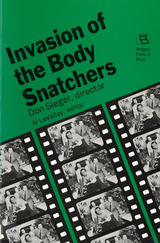2 books about director

Invasion of the Body Snatchers
Don Siegel, director
LaValley, Al
Rutgers University Press, 1989
Invasion of the Body Snatchers (1956) is a low-budget science fiction film that has become a classic. The suspense of the film lies in discovering, along with Miles, the central character (played by Kevin McCarthy), who is "real" and who is not, and whether Miles and Becky (played by Dana Wynter) will escape the pod takeover. As the center of the film moves outward from a small-town group of neighbors to the larger political scene and institutional network (of police, the FBI, hospital workers), the ultimate question is whether "they" have taken over altogether. Although Invasion can be interpreted in interesting ways along psychological and feminist lines, its importance as a text has centered primarily on political and sociological readings. In his introduction to this volume, Al LaValley explores the politics of the original author of the magazine serial story on which the film is based, Don Siegel; and of its screenwriter, Daniel Mainwaring. And he looks at the ways the studio (Allied Artists) tried to neutralize certain readings by tacking on an explanatory frame story. The commentary section includes readings by Stephen King, Peter Biskind, Nora Sayre, and Peter Bogdanovich. A section of postproduction documents reproduced here (many for the first time) includes many written by Wanger and Siegel. The volume also contains two previously unpublished framing scripts written for Orson Welles. For students and individual enthusiasts, the contextual materials are particularly interesting in showing how crucial the postproduction history of a film can be. A filmography and bibliography are also included in the volume. Al LaValley is the director of film studies at Dartmouth. He is the author of many articles on film and editor of Mildred Pierce in the Wisconsin screenplay series.
[more]

The Maltese Falcon
John Huston, director
Luhr, William
Rutgers University Press, 1995
Few films have had the impact or retained the popularity of The Maltese Falcon. An unexpected hit upon its release in 1941, it helped establish the careers of John Huston and Humphrey Bogart while also helping both to transform the detective genre of movies and to create film noir. This volume includes an introduction by its editor and a shot-by-shot continuity of the film, as well as essays on its production, on literary and film traditions it drew upon, and on its reputation and influence over the last half century. Included are reviews from the time of the film's original release, the enthusiastic French response in 1946 that helped define film noir, and a close formal anaylsis of the film. In addition, the volume contains a comparison of this version to earlier film versions of the Dashiell Hammett novel, and helpful explorations of cultural, historical, and psychoanalytic issues. Like Casablanca, The Maltese Falcon has attained iconic status; this volume will contribute to the pleasure its many fans find in viewing the film again and again. William Luhr is a professor of English at St. Peter's College in New Jersey. He is the author of Raymond Chandler and Film and co-author of Blake Edwards and other books.
[more]
READERS
Browse our collection.
PUBLISHERS
See BiblioVault's publisher services.
STUDENT SERVICES
Files for college accessibility offices.
UChicago Accessibility Resources
home | accessibility | search | about | contact us
BiblioVault ® 2001 - 2024
The University of Chicago Press









